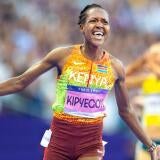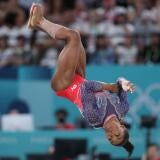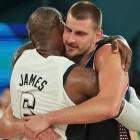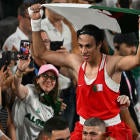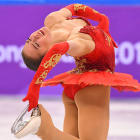 |
| "Off Balance," by Paul and Terri Williams. Olympic gold medalist Dominique Moceanu hopes the book will effect "positive change" at USA Gymnastics. Namely, getting U.S. women's team coordinator Martha Karolyi out of the picture. (AP/Simon & Schuster). |
Dominique Moceanu sure knows how to sell a book. She's got one out, a memoir, entitled Off Balance, which is basically her story of being a gymnast for the United States in 1996, and why that life was one filled with fear and pain more than joy and love.
Moceanu won gold along with the rest of the American team at the '96 Games, but it's taken 16 years since then for her to fully step into the public and share the torments and secrets that were kept from her during her adolescence.
Moceanu went on "The Jim Rome Show" Thursday afternoon to plug the book, and in the interview she laid waste to longtime American women's gymnastic Poobah Béla Károlyi, who's most famous for his encouragement and assistance of Kerri Strug's medal-winning vault moment at the Atlanta Games.
The interview is embedded in its entirety at the bottom of this post. The critical parts are from 1:30 until about the 14-minute mark. Yes, you'll want to listen to all of it. The eagerness and gush of admission from Moceanu is noticeable, to say the least.
“The general public views Béla Károlyi as a Geppetto-type persona with his ‘You can do it’ catchphrase, but in truth he’s the Teflon Don of USA Gymnastics,” Moceanu said. “Over the past decade alone, he’s made clumsy and insulting statements that have gone unchecked.”
Then came this bomb.
“Béla Károlyi makes David Stern look like Stephen Hawking,” Mocenu said, adding that the man wants to be a bigger star than his athletes, and that his demeanor when the cameras are off contrasts greatly from when everyone's watching.
Those who know this story now will probably find it impossible to keep it out of mind as they watch the 2012 U.S. women's team compete in a couple of weeks. What will the Károlyis' response be?
Moceanu said it took her seven years to write the book, and hearing some of the details, you can't blame her for needing so long to build up the courage and align her thoughts. After all, after winning gold in '96 she became the youngest gymnast to do so. Imagine being her. Then realize she had “domineering” coaches -- Béla and Martha Károlyi --and a father who “used physical punishment” on her amid training.
“I truly loved the sport and I didn’t want to let these people drive me away from it because of how they were treating me,” Moceanu said on Rome’s show.
“My father enforced physical punishment and slapped me right in the face right in front of the Károlyis when they felt I wasn’t performing up to their standards,” Moceanu added. “The summer before the (1996) Olympic Games, they would threaten me -- my coaches, the Károlyis -- they would threaten me in the gym and say, ‘I’m going to call your parents. I’m going to call your father.’ And I knew exactly what they meant. They kept me in a constant state of fear because I did not want them to call my dad. This fear just took over me.”
And there's so much more to her story, much of which she touches on later in the enrapturing interview. Moceanu sued for emancipation from her parents -- at 17, when she realized her parents were essentially robbing her of so much of the money her stature and ability had earned her. Then, in 2007, weeks before she had her first child, she discovered she had a legless sister, now named Jennifer Bricker, who was given up for adoption by her parents in 1987, when Moceanu was 6 years old. Moceanu called it “the shock of my life.”
Unbelievable. Give it a listen.
Moceanu on Rome
![[object Object] Logo](https://sportshub.cbsistatic.com/i/2020/04/22/e9ceb731-8b3f-4c60-98fe-090ab66a2997/screen-shot-2020-04-22-at-11-04-56-am.png)

